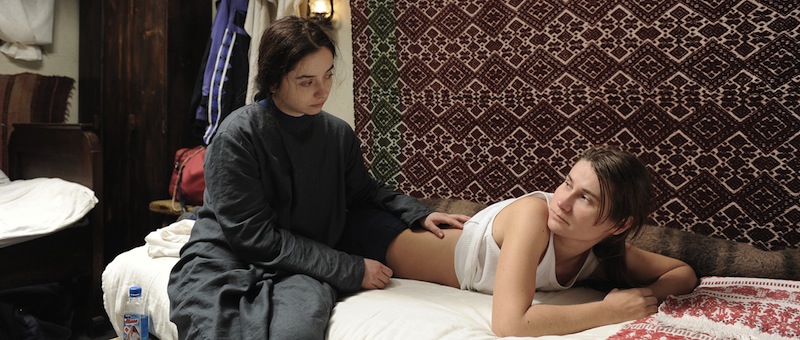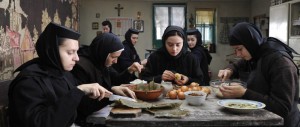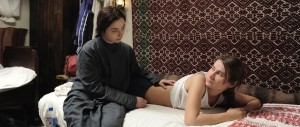După Dealuri (Beyond the Hills)

After the promising debut with Occident in Cannes Director’s Fortnight in 2002, and receiving the Golden Palm award for his film 4 Months, 3 Weeks and 2 Days in 2007, the bar of expectations for the leading figure of the Romanian new wave, director Cristian Mungiu, is set high. Returning to this year’s competition with his new film, Christian drama Beyond the Hills, we are in doubts as to whether he manages to meet the standard he has set for himself.
The film was inspired by the real story that hit the Romanian press back in 2005. It is about a girl visiting a friend in a small remote Moldavian monastery who ends up being ‘exorcised’ by the priest and the nuns a couple of weeks later. Writer Tatiana Niculescu Bran investigated the story in depth, publishing two non-fiction novels as an account of what really happened, which became the basis for Mungiu’s screenplay. With the sensibility of a former journalist, Mungiu tries to present an interpretation stripped of all the sensationalism and judgement that had built up over the years, and rather focused on the intimate relationship between two females and the ambiguity of the way best intentions may unexpectedly result in the worst actions.
Alina (Cristina Flutur) gets back from Germany to bring Voichita (Cosmina Stratan), her former orphanage classmate and the only person she loves and trusts in the whole world, back with her. But she soon discovers that Voichita has found a new love immune to treason after having been left by Alina once before: the love of God. She has settled in a remote monastery which is led by a firm priest (Valeriu Andriuta), who is a father figure to all the nuns. Without any electricity and only with the most minimal resources to survive, Voichita works hard every day, and prays even harder, convinced she has now found her calling. As Alina refuses to accept this and fights to make her lover believe she has been brainwashed, the priest denounces her possessed by a demon, and inadvertently kills her by trying to purge it.

Stretched into two and a half hours, the restrained love and scenes of spiritual and physical torment are far from a pleasurable watch. The beginning of the film is the most promising, manifesting the mature and serious storytelling style which, thanks to the dark, ‘chiaroscuric’ imagery by Oleg Mutu, and truthful performances by big-screen newbies Flutur and Stratan, places the torturing scenes on a firm base. However, the torturing itself feels stretched and forced, with nuns constantly running around screaming, and re-telling the same story of what had just happened to every new character showing up on the screen again, and again, and then again.
Despite this repetition, Beyond the Hills is a grave, solemn and consistent picture. It might not ultimately be as rewarding as 4 months, 3 weeks and 2 days, yet it is just as gripping and demonstrates Mungiu’s ability to tackle versatile subject matters, each time investigating them to their very depths. He is definitely a director we will hear from again. So if the moral conundrum of what it ultimately means to do good in Christian terms, and the depiction of how damaged the mentality of the repressed, love-deprived Eastern Europeans can be is something you are interested in, leave this picture for a rainy day.
Ruta Buciunaite























Facebook
Twitter
Instagram
YouTube
RSS